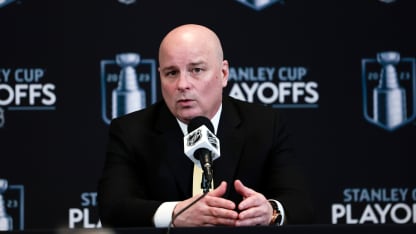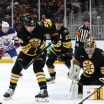While the Bruins are pleased to be leading the series, 1-0, they know there is room for improvement, particularly when it comes to adjusting to the Panthers' relentless forechecking game.
"They've done a really good job in their last 20 games of being committed to the forecheck and running really good routes and putting good pressure on you," said Montgomery. "I don't think there's an area we need to improve, but also think we weren't very clean and crisp offensively. Not only on breakouts but in the neutral zone and the offensive zone. I thought our defensive game was good; I thought our offensive game was real slow and a little lethargic."
Montgomery added that the Bruins must continue to try to keep Barkov at bay - which, of course, is no easy task. The Panthers' top centerman was held without a shot on goal in 19:51 of ice time in Game 1.
"I just think [Hampus] Lindholm and Brando [Carlo] did a really good job of having great gaps against that line," said Montgomery. "I don't look at it as a Barkov thing, I look at it like a line. [Carter] Verhaeghe has 40 goals. And for the most part, we did a really good job.
"All together we did a really good job, the way we tracked…we only gave up seven Grade-A chances. That's gonna put you in a good position to win a lot of hockey games. Unfortunately, we didn't get many more ourselves. That's where we look at where we need to improve our game."
When it comes to taming Matthew Tkachuk, who scored the Panthers' lone goal in Game 1, Montgomery said the Bruins must do their best to trap the 25-year-old in his own end as much as possible.
"I don't think anything changed with my opinion of Matthew Tkachuk after [Game 1]," said Montgomery. "I thought he was really good and I think he's a hell of a hockey player. He competes all over the ice. He gets to hard areas and that's the things that we look at. You're not gonna deter him because his compete level is so high.
"But you're going to be able to take good body position and make sure he doesn't beat you to the net front and try to take good angles so you can take away time and space. And you've got to try to make him defend. The more time he spends in his own end, the further he is away from making plays in your own end."



















